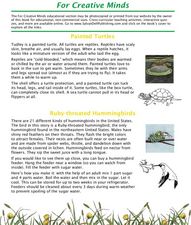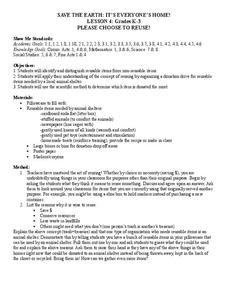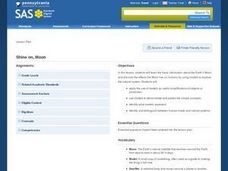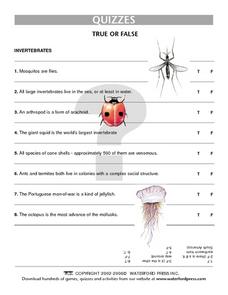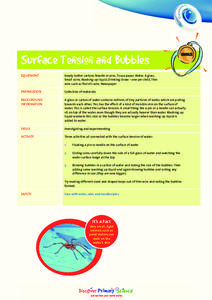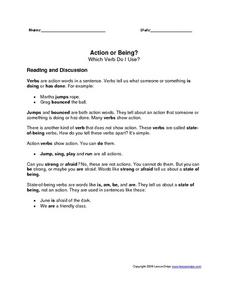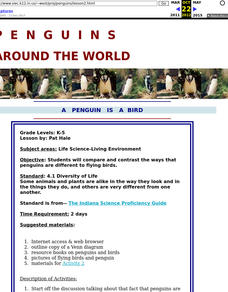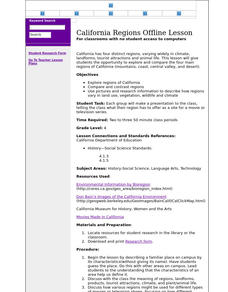Curated OER
For Creative Minds: Tudley Didn't Know
Students discover facts about the animals in John Himmselman's book, Tudley Didn't Know, and make a paper turtle. In this marsh animals lesson, students first read the book Tudley Didn't Know. Students read facts about painted turtles,...
Curated OER
Wonderfully Wild Unit
Students explore the ethics of 'fair' in regards to humans relationship with wildlife. In this wildlife study lesson, students read the story starters about wildlife and then discuss how to finish the story. Students finish the stories...
Curated OER
Save the Earth: It's Everyone's Home!
Pupils organize a donation drive based on the concept of reusing items for an animal shelter. In this reusing items lesson plan, students distinguish between reusable and non reusable items, have a donation drive, and use the scientific...
Curated OER
The Living Environment
Sixth graders show what they know about plant and animal cells. In this cell project lesson, 6th graders get to choose a project based on their learning style. They can create a visual representation of cells, auditory forms, or build a...
Curated OER
Bringing Up Birdy
Students explore biology by creating diagrams of animal life cycles. In this baby bird lesson, students view video clips of birds being born from incubation to flying on their own. Students utilize the Internet to research birds and...
Pennsylvania Department of Education
Wind and Water Wheels
Students identify wind and water as natural resources that create energy. In this natural resources and energy use lesson, students work in groups to construct a pinwheel, then explore the effects of wind and water on the pinwheel....
Curated OER
Shine On, Moon
Students explore space science by conducting an experiment in class. In this Moon lesson, students define a list of space science vocabulary and read the book The Moon. Students utilize shoeboxes and string to conduct a sunlight...
Curated OER
Protists
In this protists worksheet, high schoolers will read about the different kinds of protists including protozoans, algae, and molds. Students will then complete 2 short answer questions and 1 true or false question.
Curated OER
Quiz: Invertebrates
In this science worksheet, 3rd graders will focus on invertebrates. Students will respond to eight true/false questions about these animals.
Curated OER
Which Herp Is Which?
Students research different kinds of herps. The teacher gives the student a particular herp and the student writes a postcard (as the herp) to an in-class penpal, giving hints about the herp, but not identifying itself.
Curated OER
Understanding Climate
Fourth graders create two dioramas out of household materials to compare the influence of various factors that impact climate. Each group discuss how the change in factors influenced the climate, flora, and fauna of their area.
Curated OER
Circle of Life
Students consider why we eat and where our food obtains its energy. They illustrate food chains that might be found on an open field, dissect owl pellets, identify the remains of animals in the pellets, watch videos and participate in...
Curated OER
Ecosystems
Students create plots of land in three different ecosystems and use AppleWorks to collect data for research. This lesson includes a downloadable worksheet and can be accomplished in four days.
Curated OER
Scrambled Sentences
In this language arts worksheet, students analyze 15 scrambled sentences. Students rearrange the words to make the sentences correct and underline the nouns.
Curated OER
Surface Tension and Bubbles
Students investigate surface tension and bubbles. In this scientific inquiry lesson plan, students explore how the surface tension of water is able to support tiny objects that actually weigh more than the water as they collect date by...
Curated OER
Matter: All That "Stuff"
In this chemistry worksheet, students learn about matter, including atoms, electrons, protons, neutrons, compounds and chemical properties. They use this information to answer the 10 questions on the worksheet. The answers are on the...
Curated OER
Action or Being?--Which Verb Do I Use?
In this verbs worksheet, students read and determine if the verbs in 7 sentences are action or state-of-being verbs and write the 4 state-of-being and action verbs learned on the lines provided. Students underline the verbs in 8...
Curated OER
Wetland in a Pan
Students examine wetlands and what the effects of destroying them will do. In this wetland lesson students relate the importance of wetland functions to their own needs.
Curated OER
Unleashed: Poems by Pets
Students create a poem from the first person perspective of a pet. In this Writing/Poetry instructional activity, students read a short poem from, Unleashed. Students brainstorm what their animal may say. Students write a poem using the...
Curated OER
Erosion in Freshwater Ecosystems
Young scholars explore the concept of sediment pollution. In this erosion lesson, students discuss the process of erosion and determine how sediment pollution affects animals that live in freshwater ecosystems. Young scholars respond to...
Curated OER
A Penguin is a Bird
Students compare and contrast the ways that penguins are different to flying birds.
Curated OER
California Regions
Students explore and compare and contrast the four main regions of California: mountains, coast, central valley, and desert. students use pictures and research to describe how regions vary in land use, vegetation, wildlife and climate.
Curated OER
Seasons
Students listen to stories about the seasons, and discuss the kinds of clothing people wear for each season. They take a walk, collecting items to go with each season, then draw pictures to match the season.
Curated OER
Go Far in a Car
Students listen to the song, The Wheels on the Bus. They are shown the book, This is the Way We Go to School. Afterward, they learn the phonetic principle of rhyming words.


